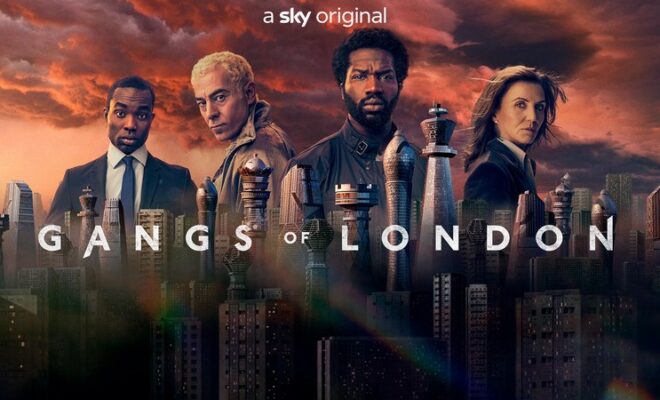
Interviews
Narges Rashidi & Waleed Zuaiter – Gangs of London
By: Jamie Steinberg
Q) Obviously, your characters aren’t really model citizens. Is there anything redeeming about your characters that you like? I mean, is there any semblance of good in both of your characters?
NARGES RASHIDI: I’ll start with that one, because that’s easy for my character. I feel like Lale is not in this world or this gangster world [for] power. She’s not in it money. She’s in it because she has this greater cause she’s doing it for and that I find is a good [unintelligible] So, that’s one, and what I love about Lale and what makes her good to me as well is her loyalty. She’s very loyal, and that makes her a good gangster villain who’s selling heroin. [laughs]
WALEED ZUAITER: For me, for Koba, it’s interesting. I would say that the kernel of good in Koba was when he was a child. There’s a whole backstory to this great, very colorful, outrageous character, but, ultimately, he grew up in a war-torn country in Georgia. I mean, his childhood was marred by brutality and barbarity. I mean, the backstory is that at the age of eleven, I think it was, that his whole family was slaughtered in front of him, and that their faces were skinned off. So, the whole idea of the mask comes from that. I thought that that was just brilliant, artistically. But when we get towards the end of the series, and season two, we hear something that Koba reveals, which is very, very rare for his character, about his childhood…From the studying I’ve done about human psychology as an actor, most of our personalities are formed very early in our lives, you know, things that happen somewhere around the age between four and six years old, that kind of shapes you, for better or for worse. So, I hope at least that what seeps out a little bit in terms of this very kind of extreme character is that humanity, which is something – these flaws and things that have shaped us from our childhood exist in all of us, and you can kind of see it, that they come out when we’re not when we’re least expecting it to.
Q) [You] talk about these sides of them, though, so tell me, how do you, I guess, connect with that? Because I know a lot of times people put parts of themselves into character, and, obviously, these characters aren’t like you. So, how do you go about connecting with that side of them? For both of you.
NARGES RASHIDI: I think, as a human being, we have everything within us, right? It’s just how much do we allow it to come out? It kind of like is a [continuation] of what you just said, Waleed. If you really dig deep into the backstory of a character and you see where they come from – you know, Lale, Kurdish PKK fighting, ISIS fighting, being in war her entire life – it does something to you, and if you really dig deep into that, and you see where it comes from, you’re not playing Evil. You know that that evil is just the outcome. You’re playing something else; you’re playing a human being with all their struggle and their backstory that kind of led them to become, in Koba’s [case] the monster he’s become, or in mine, her toughness and all that, are these villains. Yeah, but it comes from a place – like it’s not just an evil that you just open up and bring out. It’s just like, there’s a lot of research that we all do as actors, and yeah, you built it all together like a little house. You have this layer, and then you add this layer, and then you add that layer, and all of that creates this character.
WALEED ZUAITER: Yeah. I mean, what Narges just said is so right on the money. I think that we have elements of these characters already kind of within us, right? And that’s one thing. But the other thing is, is that it’s like what we observe in life and the choices that we make because I’ve seen people that are products of war. I, myself, am a product of a war; my wife is a product of two wars. What displacement and war does, it brings out the best and the worst in human nature: the best in terms of you help somebody else who’s in distress, but it brings out the worst, because it’s governed by fear, and fear makes you do some of the worst things. I don’t believe that you’re born evil. I think we’re kind of inherently born pure and innocent, and the experiences that you have in life and the choices that you make, kind of really shape you. So, when I first read the scenes for Koba, the description of it was this primal character. So, immediately I started to envision an animal. You know, in our evolution as humanity there was a time when we were in the state of nature where it was survival of the fittest. All you have to do is just look at where we are right now as a society and as a global society and the injustice is that are happening in the world, and it’s not like you have to go too far away from seeing [it]. We live in a very, very violent world, by the way. What we’re seeing in Iran right now, what we’re seeing all over the Middle East, what we’re seeing in Europe, it’s like gloves are off kind of like it’s like a free for all of violence and injustice. So, I think one of the reasons why people are connecting with our show is that they’re seeing the both the good side of human nature and the bad side and how they kind of clash up against each other.
Q) Vengeance is a big part of the series this season. In fact, the logline is “Vengeance leads to chaos.” How does that apply to both of your characters this season?
NARGES RASHIDI: I think the biggest vengeance for Lale was in season one…She’s so busy with dealing with what’s been thrown at her in season two that there was really no time for vengeance here for my character, but in season one it’s been a big subject for sure. Probably season two is the outcome of that vengeance that happened in season one, because Lale goes after Steve’s son and she kills him, and I don’t want to spoil [it]…[but] the outcome of that we will see in season two…I hope I make sense.
WALEED ZUAITER: Yeah, it is a tough question, because for Koba, it’s not really about vengeance until we get to somewhere in the middle of season two where the dominance that he’s brought in bringing order to London after the vacuum of the death of Sean Wallace from season one; that power that Koba has gets disrupted in the middle of the season. So, his vengeance is about regaining his power. As I was saying earlier, power is like a drug to Koba. He intoxicated by power and by everything that he gains from it. So, I think what happens is that his vengeance turns into ambition, and ambition is, again, without giving anything away, a very, very slippery slope. When you’re in a leadership position and trying to kind of gain everybody’s loyalty and for them to bow to you, it’s a very messy, messy, slippery slope that that Kobo has when it comes to vengeance.
Q) Lale, and Sean Wallace start off in a very different kind of equation, and slowly there is an attraction between them. How does this attraction come about, since they are such very different people?
NARGES RASHIDI: You know, there’s a saying where they say, two different poles attract one another. I think that’s what it is between those two. They come from very different worlds. They’re actually like; they actually irritate one another all the time by everything they do, and I think there is an attraction and a sexuality in that. There is also an understanding in their silence with one another that they both have a mutual understanding without having to ever talk about it. It’s an unsaid understanding. Those things, I think, are what builds that relationship, for me.
*CONFERENCE CALL*



You must be logged in to post a comment Login